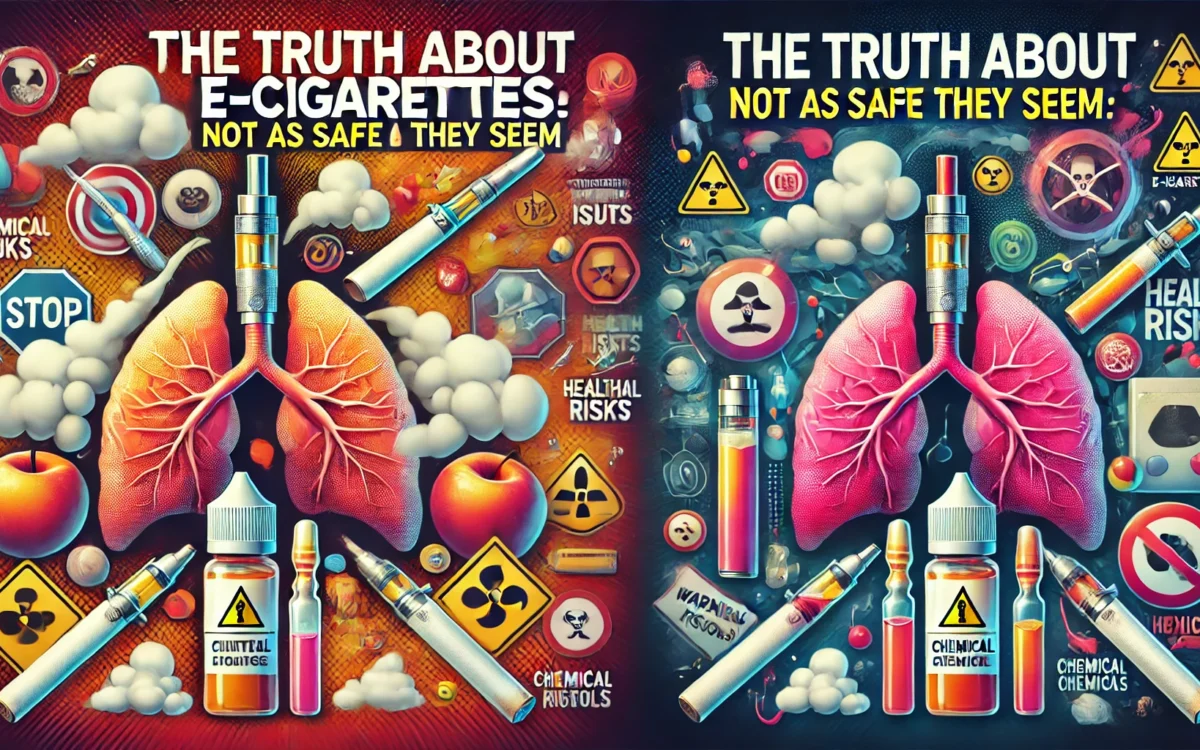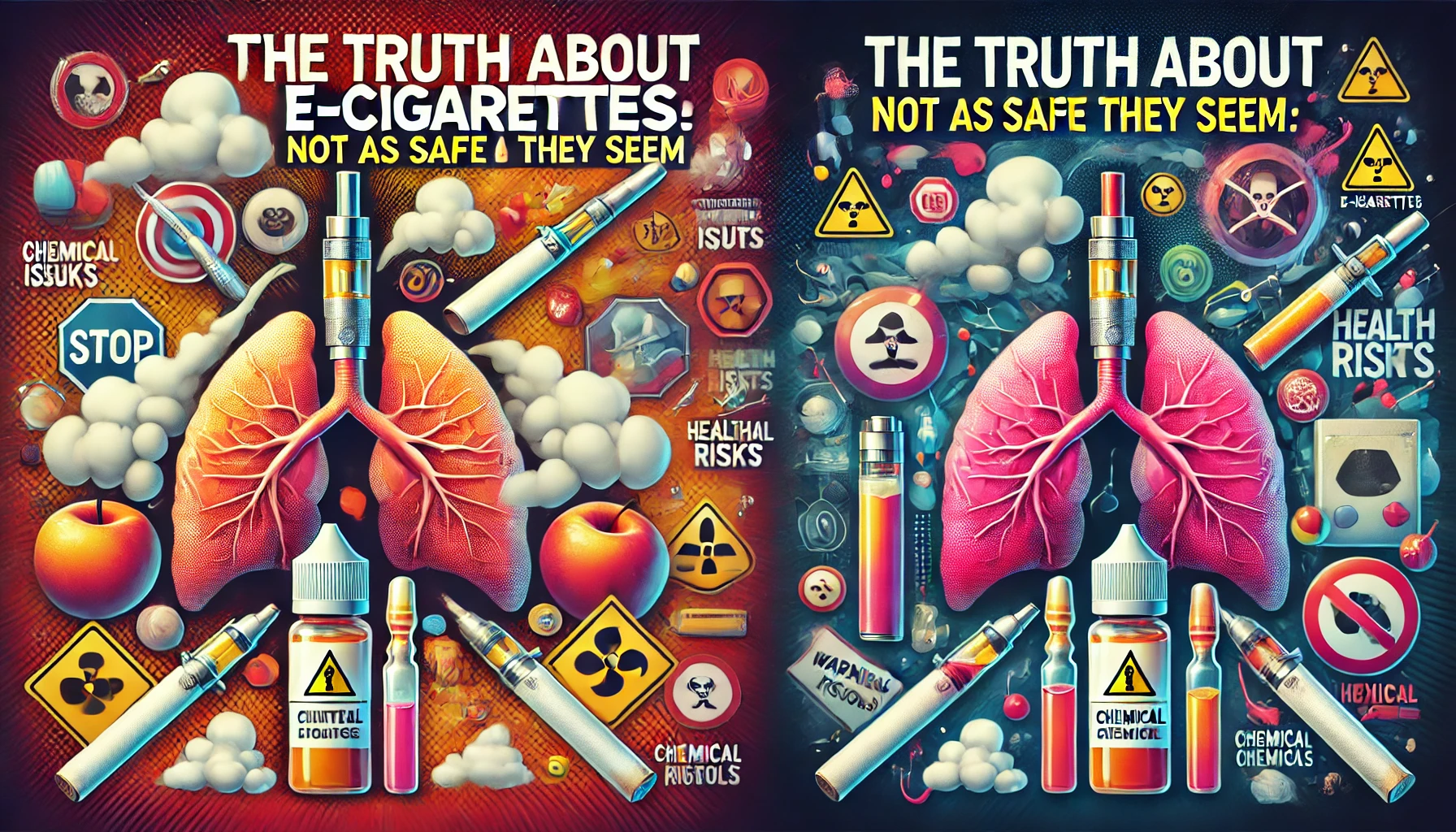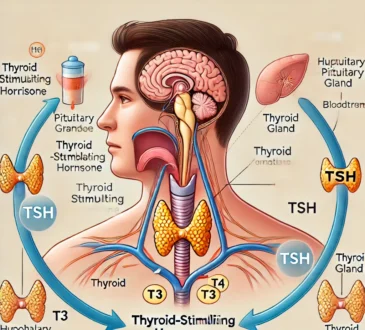Over the past decade, e-cigarettes have surged in popularity, revolutionizing the way many people consume nicotine. These battery-operated devices, often marketed as a safer alternative to traditional smoking, have created a billion-dollar industry. However, their rise has sparked intense debate among health professionals, policymakers, and the public.
What Are E-Cigarettes?
E-cigarettes, short for electronic cigarettes, are battery-operated devices designed to deliver nicotine, flavorings, and other chemicals to the user in the form of an aerosol, commonly referred to as vapor. Unlike traditional cigarettes, e-cigarettes do not burn tobacco. Instead, they use a heating element to warm a liquid solution (often called e-liquid or vape juice) that typically contains the following components:
1. Nicotine: The addictive substance also found in traditional cigarettes, which can affect brain function and cardiovascular health.
2. Flavorings: These are added to create a wide variety of flavors, ranging from tobacco and menthol to fruity and dessert-inspired options.
3. Other Chemicals: Propylene glycol and vegetable glycerin are common base ingredients in e-liquids, used to create the aerosol and enhance the vaping experience.
E-cigarettes come in various forms, including vape pens, pod systems, and mods, and are often marketed as a less harmful alternative to smoking or a tool for smoking cessation. However, their safety, particularly for long-term use, remains a subject of ongoing research and debate.
The Appeal of E-Cigarettes
One of the primary reasons for the popularity of e-cigarettes is their perceived reduced harm compared to traditional smoking. Many users, particularly those trying to quit smoking, see vaping as a stepping stone toward cessation. E-cigarettes also offer a customizable experience with various flavors and nicotine strengths, appealing to a broad demographic.
In addition, the lack of combustion means that e-cigarettes produce fewer harmful chemicals compared to traditional cigarettes. For many, this makes vaping an attractive alternative, especially in countries with strict smoking bans.
Harmful effects of E-cigarettes
1. Respiratory Health Concerns: The inhalation of aerosol produced by e-cigarettes can irritate the lungs and airways. Studies have linked vaping to various respiratory issues, including coughing, wheezing, bronchitis-like symptoms, and an increased risk of lung infections.
2. Nicotine Addiction: E-cigarettes often contain nicotine, a highly addictive substance. Many users, especially young people, become hooked on vaping, which can lead to long-term addiction and subsequent health risks.
3. Cardiovascular Risks: Nicotine and other chemicals present in e-cigarette aerosol can raise blood pressure and heart rate, potentially increasing the risk of heart disease and related cardiovascular problems.
4. Impaired Lung Function: E-cigarette use has been linked to decreased lung function, similar to the effects of traditional smoking. This impairment can lead to reduced exercise capacity and overall physical fitness.
5. Lung Injuries: A phenomenon known as “vaping-associated lung injury” has been reported, leading to severe respiratory distress, lung damage, and even fatalities in some cases. These incidents have raised alarms about the safety of e-cigarette use.
6. Youth and Brain Development: The adolescent brain is particularly susceptible to the effects of nicotine. E-cigarette use among young people can disrupt brain development, impacting cognitive function, learning, and attention span.
7. Unknown Long-Term Consequences: E-cigarettes are a relatively recent phenomenon, and the long-term health consequences are still not fully understood. Users could potentially face unforeseen health risks down the line.
Hibiscus tea reduces the risk of high blood pressure in these 7 ways!
8. Gateway to Traditional Smoking: Some studies suggest that using e-cigarettes can act as a gateway to traditional cigarette smoking, especially among young individuals who might have never smoked otherwise.
9. Chemical Exposure: The aerosol produced by e-cigarettes contains a mixture of chemicals, some of which can be harmful when inhaled. These chemicals can vary depending on the type of e-cigarette and the liquid used.
10. Secondhand Exposure: E-cigarette aerosol is not harmless water vapour. Secondhand exposure to these aerosols can potentially affect non-users, particularly children and pregnant women, causing respiratory issues and other health concerns.
11. Flavoring Chemicals: E-cigarettes often come in a variety of flavours, appealing to both adults and young users. However, some of these flavouring chemicals can pose risks when inhaled. Certain flavouring compounds have been linked to lung irritation and other adverse respiratory effects.
12. Dangers of DIY Modifications: Some users modify or customize their e-cigarettes by altering the devices or using homemade e-liquids. These modifications can introduce additional risks, as they might lead to overheating, release of harmful chemicals, or malfunctioning of the device.
13. Unregulated Products: The e-cigarette market has grown rapidly, leading to the availability of a wide range of products. However, the lack of strict regulations and quality control means that some products might not accurately disclose their ingredients or potential risks.
14. Withdrawal Symptoms: Those who become addicted to nicotine through e-cigarettes can experience withdrawal symptoms when trying to quit. These symptoms can include irritability, anxiety, difficulty concentrating, and intense cravings.
15. Social Implications: E-cigarette use can have social implications, especially in public spaces. The visible aerosol produced by vaping might lead to discomfort for non-users and raise concerns about exposure to potentially harmful chemicals.
16. Economic Costs: While e-cigarettes might initially seem cost-effective compared to traditional cigarettes, the long-term health consequences can lead to significant medical expenses for individuals dealing with vaping-related health issues.
17. Mental Health Concerns: The addiction to nicotine and the act of vaping itself can have psychological effects. Some individuals may experience heightened anxiety or depression related to their e-cigarette use.
18. Ethical and Environmental Concerns: The disposal of e-cigarette cartridges and devices contributes to electronic waste. Additionally, the marketing of flavoured e-cigarettes has raised ethical questions about targeting younger audiences and potentially hooking a new generation on nicotine.
“Unlocking the Secrets of Global Warming: Understanding, Impacts, and Solutions”
19. Lack of Smoking Cessation Success: While e-cigarettes have been promoted as a smoking cessation tool, research suggests that their success rates are relatively low compared to other evidence-based methods.
20. Changing Industry Dynamics: The e-cigarette industry is constantly evolving, introducing new products and technologies. This rapid evolution can make it challenging for consumers to keep up with the potential risks associated with these products.
E-Cigarettes and Youth
Perhaps the most concerning aspect of the e-cigarette boom is its popularity among young people. Flavored e-liquids, social media promotions, and sleek device designs have made vaping particularly appealing to teenagers. For example, flavors like mango, cotton candy, and bubble gum are often cited as contributing to the youth appeal. According to recent studies, e-cigarette use among high school students has reached alarming levels, with surveys reporting that nearly 20% of high school students in the United States vaped in the past month. This trend raises fears of a new generation addicted to nicotine, potentially reversing decades of progress in tobacco control.
This surge in youth vaping has prompted regulatory action in many countries. For instance, flavor bans and restrictions on marketing practices aim to curb the appeal of e-cigarettes to minors. However, enforcement remains a challenge.
Policy and Regulation
Governments worldwide are grappling with how to regulate e-cigarettes effectively. Some countries, like the United Kingdom, promote e-cigarettes as a harm-reduction tool, integrating them into smoking cessation programs. The UK’s approach includes endorsing e-cigarettes as a safer alternative for smokers and funding public health campaigns to educate users about their potential risks and benefits. Others, such as India and Brazil, have opted for outright bans, citing public health concerns and the potential for e-cigarettes to introduce a new wave of addiction, particularly among youth. These bans often stem from fears that the popularity of vaping undermines broader anti-smoking efforts.
The United States has taken a middle ground, implementing policies like raising the minimum purchase age to 21 and requiring manufacturers to submit their products for FDA review. However, the patchwork of state-level regulations often leads to confusion and inconsistency.
The Future of E-Cigarettes
As research continues to shed light on the risks and benefits of e-cigarettes, their role in public health remains a topic of heated debate. On one hand, e-cigarettes hold promise as a harm-reduction tool for adult smokers seeking to quit traditional cigarettes. Studies suggest that vaping may help reduce exposure to harmful toxins compared to smoking combustible tobacco products. Public health campaigns in some countries actively promote e-cigarettes as part of cessation programs, emphasizing their lower health risks for current smokers.
On the other hand, the rapid rise in youth vaping has created significant public health concerns. The appeal of e-cigarettes to minors, driven by targeted marketing, flavored products, and social influences, threatens to foster a new generation of nicotine addiction. Additionally, the long-term effects of e-cigarette use remain poorly understood, particularly with regard to chronic diseases such as cancer, cardiovascular conditions, and respiratory ailments. Research is ongoing to determine how sustained use of e-cigarettes impacts the body over decades.
Policy decisions will play a crucial role in shaping the future of e-cigarettes. Striking the right balance between regulating products to prevent youth access and leveraging their potential to reduce smoking-related harm among adults will be essential. Collaborative efforts between governments, health organizations, and manufacturers can help ensure that e-cigarettes serve as a net benefit to public health rather than a new crisis in the making. Ultimately, the future of e-cigarettes will hinge on the evidence-based decisions made today by policymakers, alongside the willingness of society to address both their risks and opportunities.






